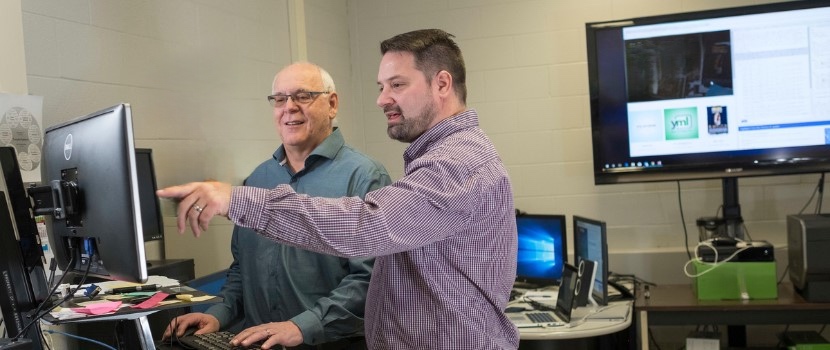
Sask Polytech uses Siemens Xcelerator portfolio of software to enhance students’ understanding of multiphysics simulation and enhance applied research opportunities
July 3, 2024 – Siemens has granted state-of-the-art simulation equipment to Saskatchewan Polytechnic’s Digital Integration Centre of Excellence (DICE). This collaboration with Siemens will enhance students' understanding of multiphysics simulation and provide new opportunities for applied research. This simulation equipment will allow DICE researchers to create a digital twin, which combines the real world with the digital world. By capturing real-time data, the digital twin understands the current state, simulates the future state and is a basis for optimization.
“This is an incredible opportunity for Sask Polytech students and our DICE applied research partners,” says Dr. Susan Blum, Sask Polytech's vice president of applied research and innovation. “Siemens is on the leading edge of technology and is helping Sask Polytech develop the next generation of digital talent with state-of-the-art software. Thank you to Siemens for investing in Sask Polytech, our students and our applied research capabilities.”
With this grant of Siemens Xcelerator portfolio of industrial software, DICE will be able to create a digital twin, a virtual representation of a physical object or system. This digital twin will combine real-time data, simulation and modeling techniques to mirror the behavior and performance of its physical counterpart. Digital twins are used across various industries, including manufacturing, healthcare, transportation and energy, to optimize performance, monitor operations and facilitate decision-making.
"Digital twins are revolutionizing industries by providing a virtual mirror of physical systems, enabling real-time insights and predictive capabilities,” says Melanie Spare, Academic Enablement director at Siemens Digital Industries Software. “By integrating software from Siemens into its program, Saskatchewan Polytechnic is not only equipping students with cutting-edge skills but also accelerating digital transformation, empowering them to innovate and solve real-world challenges in today's rapidly evolving technological landscape."
"This unique set of tools from Siemens will allow DICE to further enhance what we offer our industry partners through the addition of advanced modeling into our artificial intelligence solutions," says Dr. Terry Peckham, DICE director and research chair at Sask Polytech. "This collaboration with Siemens not only benefits our students and research partners but also introduces them to some of the most advanced software tools that industry is just beginning to adopt."
Sask Polytech is preparing to install the software from Siemens on its high-performance artificial intelligence server, which was received under the Canada Foundation for Innovation (CFI). This installation will significantly increase the research, testing and training capacity at Sask Polytech, further positioning the institution as a leader in digital integration and cybersecurity engineering.
The integration of Siemens' simulation technology into the DICE portfolio will provide students with valuable skills and knowledge that are in high demand in today's rapidly evolving technological landscape and applied research partners with access to cutting-edge equipment.
DICE is Saskatchewan’s first Technology Access Centre (TAC), funded by Innovation Saskatchewan and the Natural Sciences and Engineering Research Council of Canada (NSERC). The DICE team is looking forward to helping new partners find creative ways to put artificial intelligence to good use.
“We’ve only seen the beginning of what AI and related digital technologies can do,” says Peckham. “It’s a great privilege to be working alongside our partners in various sectors to explore and put into practice new ways of working with data. We all stand to benefit when new areas of knowledge are put into practical applications in our day-to-day lives.”
Learn more at saskpolytech.ca/dice.

